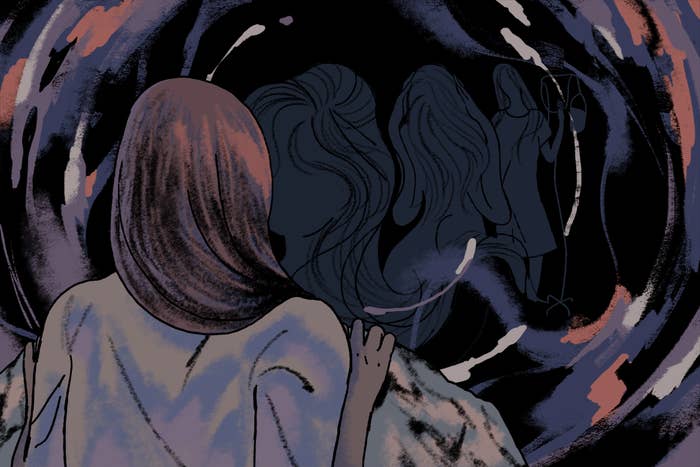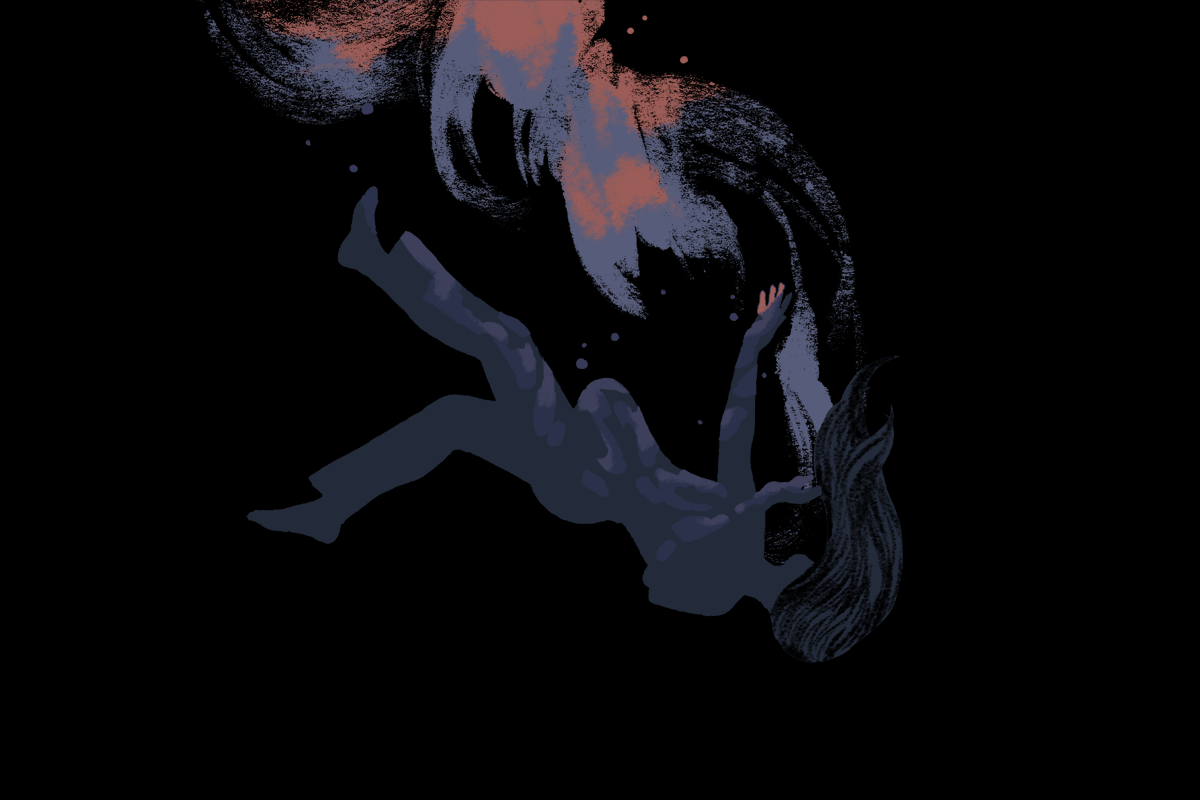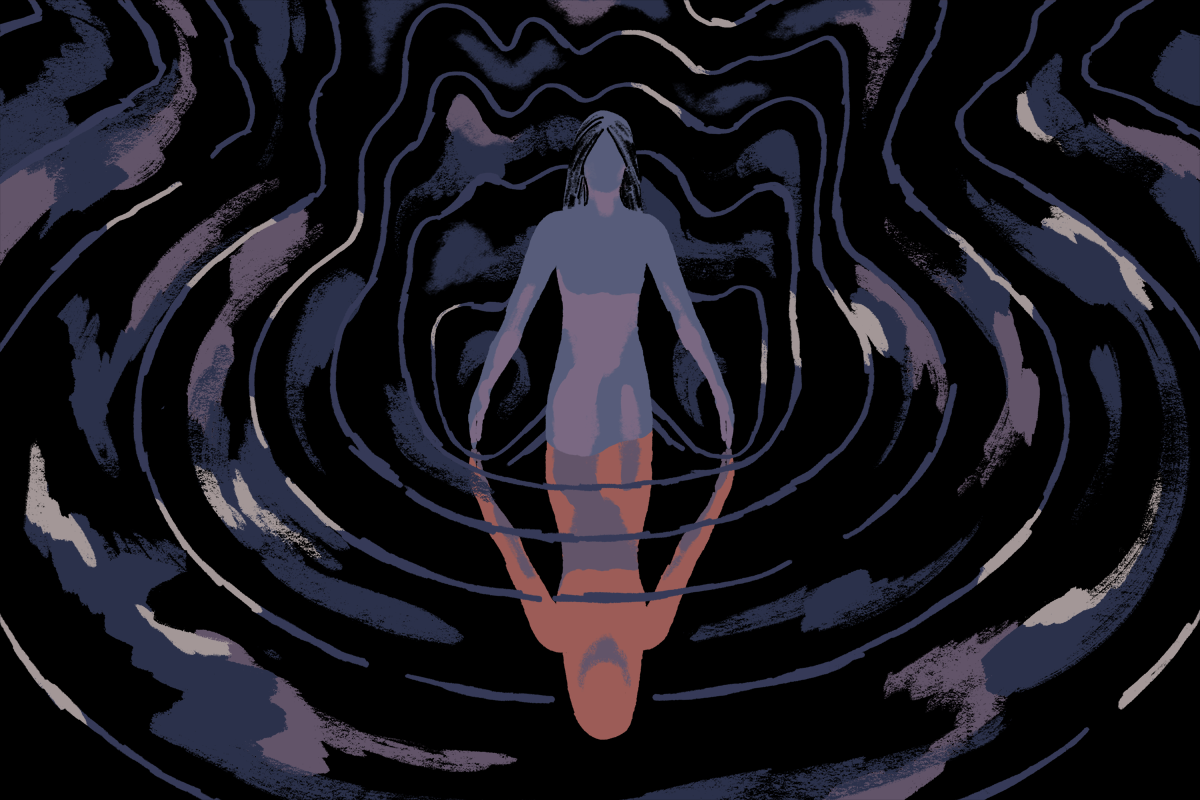
I started thinking of myself as chronically ill after cancer took my thyroid but I didn’t start saying it publicly until a traumatic brain injury took my ability to function as what I thought an adult should be — entirely independent, consistently energized, and always able. Gone were the days of waking up early to go to the gym before an eight-hour day at the office. Instead, I fell asleep in the middle of the day and woke up when the sun was already down.
I ate frozen food and texted my partner to ask him to refill my ice pack. I lost the first job I had ever had that let me actually save money. Everything I imagined my adulthood would be — which I now realize was heavily informed by ableism — was gone. Lost without the markers of traditional adulthood, I looked for something else to cling to. How could I make sense of the world I found myself in?
At first, the label of "chronically ill" fit like a sweater that was one size too small and a little itchy. I started following other chronically ill people on Twitter and Instagram, and marveled at their vulnerability. Could I ever be so brave? Could I ever be so honest about how sick I was? Was I even sick enough to qualify? I started dropping it into conversations with friends and families, and watched their faces carefully for a reaction. I tweeted about being chronically ill and frantically watched my notifications, hoping for validation. Every retweet meant something to me: There were people out there who were experiencing the world like I was. I started writing about chronic illness not only from a journalistic point of view, which I’d done before, but also from a personal place. With each small step, I wondered, Was calling myself chronically ill basically waving a white flag? Was I accepting that I would always be sick? In publicly claiming this identity — on Instagram and Twitter, and in articles like this one — was I ruining my chances at ever being employed full-time again? Internalized ableism and the ghost of my own experiences told me that no one would want to hire a chronically ill person over a “healthy” person. In my worst moments, I didn’t even blame these bosses. Who would want me entering a Zoom meeting from my pitch-black bedroom with an ice pack melting on my head when they could have someone sitting cheerfully upright in an office chair for eight hours?
I tweeted about being chronically ill and frantically watched my notifications, hoping for validation. Every retweet meant something to me: There were people out there who were experiencing the world like I was.
The changes came slowly and then suddenly, the way changes often do. When it became clear I had to leave a well-paying, stable job because the company wouldn’t make reasonable accommodations, I was devastated. In an email complete with a doctor’s note, I asked to be allowed to work from home for at least half the day because “my brain just needs a few more months to be better.” (Did I actually think it would get better or did I just want my boss to believe I would be “able” again? I think it was both. I couldn’t yet believe that this was my new normal.) But even that request was denied. (Although two months later, the entire company went remote when the pandemic began in the United States in earnest. It was wildly painful to watch how easily the company could have let me work remotely if they wanted to.) I had tried to hang on as long as I could — through my employer taking away any work-from-home options and transitioning me from a salaried position to an hourly position where I would only be paid for the hours I clocked from my desk. I started having nightmares about forgetting to clock in and each morning as I drove to the office, I felt the tight vise of anxiety wrap around my chest. I watched as my position dwindled and what remained of my health went with it. It became clear to me that I couldn’t force myself into the office with the severity of symptoms I was still experiencing less than one year after my traumatic brain injury. But with that realization came a crushing heartbreak. My health had cost me so much: years of my youth lost to treatment, hospitalization and flares, tens of thousands of dollars, and now the first taste of stability I’d had in my adult life. But in the wake of that devastation came something else: anger. I was capable of doing my job; I just needed to do it from home, where I could control the lights and sounds to avoid or soften a flare of symptoms. I could get my work done just as well from my bed as from my office chair. But my bosses didn’t see that. They said it wouldn’t be fair to other employees if I got to work remotely. What I wanted to say was, "Do other employees have blinding migraines and bleeds in their brain?" But I didn’t say anything. I quietly left and I grieved for the life I thought I was going to have. And somewhere in the mess of that grief, I began constructing a life that worked for me. I started calling myself chronically ill. It’s critical to note that I hold a massive amount of privilege in the chronically ill and disabled community because I’m white, which means my pain is more believed than the pain of women of color, though it is still less believed than men’s pain. And my illness is invisible. Looking at me, you wouldn’t know I’m sick. Though, even this is a double-edged sword: On one hand, I’m not judged in the same way as a person with a visible illness or disability. And on the other, sometimes people don’t believe I’m sick because I don’t “look sick.”

Why did it take so long to call myself chronically ill? I’ve had debilitating migraines since I was a child. I had cancer in my early 20s. And a car accident left me with a traumatic brain injury, the effects of which still ripple acutely through my life more than two years later. There were times when I dipped my toe into the waters of self-identification. When I started grad school, I had only been cancer-free for two months and still had to take medication regularly. I emailed each of my professors and told them that I had been sick and I was getting better, but if they saw me taking medication in class, that was why. (Now I wonder why I felt like I had to explain at all.) Most were affirming and supportive, but one took me out of class during a quiz and told me that if I was in need of accommodations, I might want to think hard about whether now was the time to be in a strenuous graduate program. I nodded, fighting back tears. When class ended, I hid in a bathroom stall and cried because that professor had said my own worst fears aloud. What was I, a sick person, doing in grad school? How was I going to make it through? I was devastated then but I’m angry now. I hadn’t even been asking for accommodations. I was just telling her that if she saw me taking medication in class, that was why. And even if I had been asking for accommodations, that didn’t mean I couldn’t hack it in grad school. Critically, there is a law, Section 504 of the Rehabilitation Act, that protects disabled students from discrimination and requires that schools remove barriers to learning.
Years later, at the job I later had to leave, I tried again, however feebly, to advocate for myself. But I wasn’t ready to push for what I needed because that would have meant accepting how sick I was. At that time, I was still dreaming of a day when I would wake up without pain. If I were to hold on to that dream, on which so much of my mental health relied, I couldn’t push for accommodations. When a trusted supervisor gently suggested I might apply for disability benefits, I balked. I wasn’t disabled. I couldn’t take benefits meant for people in much worse positions than I was. Although I was sure I wouldn’t apply for benefits, I looked up the legal definition of disabled: “an individual who has a physical or mental impairment that substantially limits one or more major life activities.” It was a strange, shattering moment when I realized I easily met the parameters of that definition. But I wasn’t ready to contend with what that meant for my life so I swiped the page away and cleared my search history.
I’m not the only one who found it difficult to look my sickness in the face and talk about it with other people. Becca, a 32-year-old with Crohn’s disease among other related issues, couldn’t bring herself to discuss her disability with the resource center at her university even though colleges are legally obligated to offer accommodations. Because of that understandable hesitation, she missed out on accommodations that would have made school more accessible for her. “But I didn’t want to share what was happening, probably because of a combination of humiliation and a bit of pride,” she said. “I really feel like accepting my disability was like going through the stages of grief and denial was a big part of it. Then, anger and depression. Finally, acceptance, about a decade or more later.” Aparna Nair, PhD, a professor of history at the University of Oklahoma who studies disability and public health, says it’s understandable that people may be uncomfortable claiming, acknowledging, or accepting disability. “Society tells us we should be ashamed, silent, and in denial about our differences, rather than look it in the eye and choose how others talk about it to us,” Nair said.

This makes sense to me intuitively. When I’m at home, I don’t have to mask my chronic illness. I can pull the blinds shut and take my medication and fill up my ice pack and lay in the quiet with tiger balm on my temples. Being at home means I don’t have to pretend to be less sick than I am or hide my symptoms. It is such a profound relief that I find myself hesitant to venture far outside my neighborhood. What if I have a flare and I need to get home? I cannot be sick in public in any way comparable to the way I can be sick at home. Among my friends, I’m well known for leaving parties or social events without saying goodbye to anyone (also known as the Irish exit / French farewell / Dutch goodbye). It’s become a joke and it’s one that I laugh at, but the truth is I leave without saying goodbye when I’ve run out of the energy to pretend I’m not sick. When I’m all out of spoons, when the pain comes, there is only panic and a desperate desire to be alone in my bedroom, where I can be as sick as I am.
But I’m starting to be more open in more places about what my life is actually like, with migraines and a history of cancer and a traumatic brain injury. Despite warnings from family and loved ones that I’m compromising my career by being openly chronically ill, I’m still writing things like this. Nair said she had a similar experience, with her social network suggesting that claiming an epileptic identity would hinder not only her job opportunities but also potential immigration. “Thankfully, I’m too stubborn to listen,” she said. “I spent two decades never naming my illness for fear it would ‘tarnish’ me socially. It’s a profound relief for me.”
It’s a profound relief for me too. I’ve started to be honest about just how sick I am and how I’m feeling from day to day. It’s not always easy and sometimes I fall back into what feels easier to me: masking my illness and lying about what’s happening to me. The truth is there’s no straight line from diagnosis to acceptance when it comes to chronic illness. I’ve been chronically ill since I was first diagnosed with chronic migraines at 11 years old and it’s only now that I’m 28 years old and my medical history has expanded to encompass cancer and a traumatic brain injury that I feel like I can claim that identity. At first, I didn’t want to believe I was chronically ill. I still held on to a hope that one day, my migraines would vanish. Then, when cancer came into my life, I found myself hedging again: "My treatment had only taken two surgeries and two rounds of radiation. Surely that didn’t make me forever sick." (This, despite the fact that I have to take a drug every day for the rest of my life and be monitored yearly for recurrence.) By the time I was going through cancer treatment while contending with chronic migraines, I did feel chronically ill. But I thought admitting that would be a letdown to everyone around me who was trying to support me through what they saw as a bout of illness in my life, as opposed to a life of illness. And I couldn’t help wishing the same for myself because I had also been affected by our society’s tendency to worship at the altar of health.
The truth is there’s no straight line from diagnosis to acceptance when it comes to chronic illness.
After the traumatic brain injury that left me with a severe concussion, a bleed in my brain, and the worst migraines of my life, I started to fold my cards. Fine. I was sick, chronically. It wasn’t going to just go away one day. But that realization came with a deep despair. It’s difficult to realize you are never going to function like an able-bodied person. (Sometimes, I wonder what the last able-bodied day of my life was and if I enjoyed it. I had no idea what was coming.) And that’s what I want to be honest about: the hopelessness I felt when I realized I was chronically ill. I never wanted this to be my story. Even though 40% of Americans are estimated to have a chronic disease, I didn’t think I would be one of them — especially before I even hit 30. Sometimes, I’m overcome by the amount of prescription medications it takes to keep my body trudging from one day to the next. Sometimes, I do mental tallies of all the money I’ve spent on medical treatment. Sometimes, I can’t shoulder the thought of being forever sick.
But sometimes, it’s a relief. The label of chronically ill has gone from an itchy sweater to an oversize cardigan. It fits me imperfectly but it keeps me warm. There are still days when I’m devastated by the facts of my body and all that it needs and all that it refuses to do. But I’ve found other people who know what that devastation feels like and that has made all the difference. I take back a little of what I’ve lost by being honest about it. Here: my body, its imperfections, its limits, its great efforts. Here: my blackout curtains, my ice pack, my medications. Here: my devastation, my heartbreak, my acceptance. It has taken so long to get here and the place I’m trying to end up keeps moving. I am forever sick and I am forever in pursuit of some kind of peace with my body. But here is the thing able-bodied people don’t seem to understand: I’ve been finding that peace by accepting what is true. I am chronically ill. I have chronic migraines, a history of cancer, and a traumatic brain injury. The pharmacist around the corner knows my name. I have to spend hours on the phone with my insurance company each month asking them to cover the medications that keep my body being a body. This is my life. And pretending it’s not only added to the grief. What I’m trying to say is saying I’m chronically ill isn’t me giving up. It’s me living in this painful and scarred body the best way I know how. It doesn’t matter if it makes you uncomfortable to hear me call myself chronically ill. It doesn’t matter if you think this is me giving up. It only matters how I find a way to live in the body I’m in. And this is what I choose.
Sometimes, I wonder if I’m ruining my own chances or taking up space that should belong to someone else or uselessly screaming into the void. But then, the pain swells from background noise into a screeching, panicked alarm and I pull the blinds closed and I know I have to tell the truth about what’s happening to me and millions of other people with chronic illnesses and disabilities. We shouldn’t have to hide. In small, brave moments, I choose not to.
